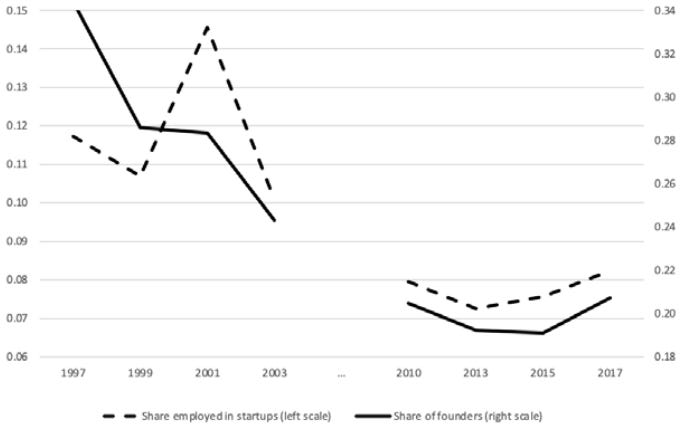Over the last two weeks, I spent my Wednesday notes on exploring the lack of productivity growth in recent decades. Last week, we saw how the amount of research produced in technology, engineering or medicine has grown enormously, but research productivity (in the sense of creating new ideas) has declined steadily. As I will show today, this seems to be a major driving force that holds back job creation and productivity growth in the real economy as well.
A 2020 paper by Thomas Astebro and his colleagues shows some pretty horrific statistics about start-up activity in the United States. What they show is that since 1997, the share of science and engineering PhDs who go on to start a business has declined by about one third. Similarly, the share of PhDs employed in start-ups has declined in lockstep.
Share of PhDs employed by or founding start-ups
Source: Astebro et al. (2020)
This decline in start-up activity is not something that is linked to gender, ethnicity, the field of study or similar effects. Instead, the research indicates that founders of start-ups get increasingly more experienced before they start a business of their own. Founders in 2017 had about 14% more work experience post their academic career than in 1997 when they started their businesses.
What seems to happen here is that science and engineering PhDs have to sift through more and more research to come up with ideas and need more time to accumulate the knowledge necessary to master the technology they work on. In essence, too much knowledge created in a field slows down the speed at which this knowledge is translated into real-life technological progress.
And it slows down the rate at which jobs are created. The chart below shows the number of jobs created in the US by large companies and small companies. Small businesses (defined as businesses with less than 1,500 employees and less than $41.5m in annual revenues) were almost twice as many as large businesses. Small businesses are the drivers of productivity gains and economic progress, but this driver is slowing down – not because we have too little knowledge but because we may have too much.
Number of jobs created in the US by size of business
Source: Small Business Administration






I remember that there was a huge Biotech bubble in the late 1990s around the time when whole genome sequencing was developed. My guess would be that you need a lot of PhD's for stuff like that but not for all the software and tech startups that dominated since the 2010s.